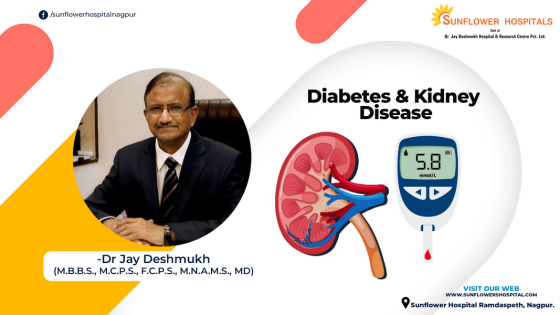How does diabetes affect kidneys?
Kidneys have millions of tiny blood vessels known as glomeruli. Glomeruli filter waste from the blood. Damage to these vessels can lead to diabetic nephropathy. This gradually may lead to kidney failure. Many diabetics have hypertension that too damages the kidneys. Overuse of painkillers and some herbal medications can worsen kidney disorders. Urinary bladder function is also affected at some stage. This leads to incomplete emptying and recurrent urinary tract infections.
How can you keep your kidneys healthy?
Managing high blood glucose, high blood pressure, and high cholesterol values are important. Get your HbA1c at least 3 times a year and keep it below 7%. Check your blood pressure regularly and keep it below 140/90. Eat foods low in salt, eat more fruits and vegetables. Be physically active and take your medications as directed. Certain anti-diabetic medications protect the kidneys from the toxic effects of high blood glucose. They should certainly be used. Getting enough sleep, quitting smoking, treating obesity, and getting active are important issues.
How to diagnose diabetic kidney disease?
During regular follow-up of diabetics, kidney function detection is always done. The presence of even small quantities of albumin, a protein, in urine is a reflection of early kidney involvement. Kidneys if normal do not filter proteins. They filter creatinine. The measurement of creatinine in blood helps to find out the glomerular filtration rate. A low rate implies poorly functioning kidneys. Ultrasound CT scans or MRI of the kidneys are suggested on a case-to-case basis. In some, a kidney biopsy is necessary.
What are the symptoms of diabetic kidney disorders?
In the early stages, there would be no symptoms. Symptoms in later stages include high blood pressure that is difficult to control. Swelling of feet, ankles, legs, face and eyes. Foamy urine. Loss of appetite, exhaustion, nausea and vomiting, and itching are a few additional symptoms.
What are the risk factors?
Uncontrolled high blood glucose, uncontrolled hypertension, smoking, high cholesterol levels. and a family history of diabetes and kidney failure are important risk factors.
What is the treatment for advanced diabetic kidney disorders?
Kidney dialysis is done 3 times a week. This removes waste products and extra fluids from the body. Each session lasts for 3 to 5 hours. In some kidney transplantation may be necessary. If you have kidney failure, and you do not want dialysis or a transplant, medical treatment may make you feel comfortable, but your life span would be curtailed significantly.
What are the other problems associated with diabetic kidney disease?
Besides hypertension, coronary artery disease, peripheral neuropathy, and involvement of your retina is usually present. Treatment of all these disorders becomes very important to lead a healthy life.
What is the treatment for kidney disorders caused by diabetes?
The first step is to treat and control diabetes and high blood pressure. Appropriate control may delay further deterioration and complications. BP treatment must include ACE inhibitors or ARMS. Newer antidiabetic drugs like SGLT 2 inhibitors and GLP-1 receptor agonists might work for you. Statins can lower cholesterol and delay damage to the kidneys. Eplerenone might help reduce kidney damage in diabetics.
Author: Dr Jay Deshmukh
Dr Jay Deshmukh is Chief Physician and Director, Sunflower Hospital, Nagpur Honorary Physician to Honorable Governor of Maharashtra and PondicherryCentral. Dr Jay Deshmukh is an M.B.B.S., M.C.P.S., F.C.P.S., M.N.A.M.S., MD From Internal Medicine – Bombay and New Delhi.


